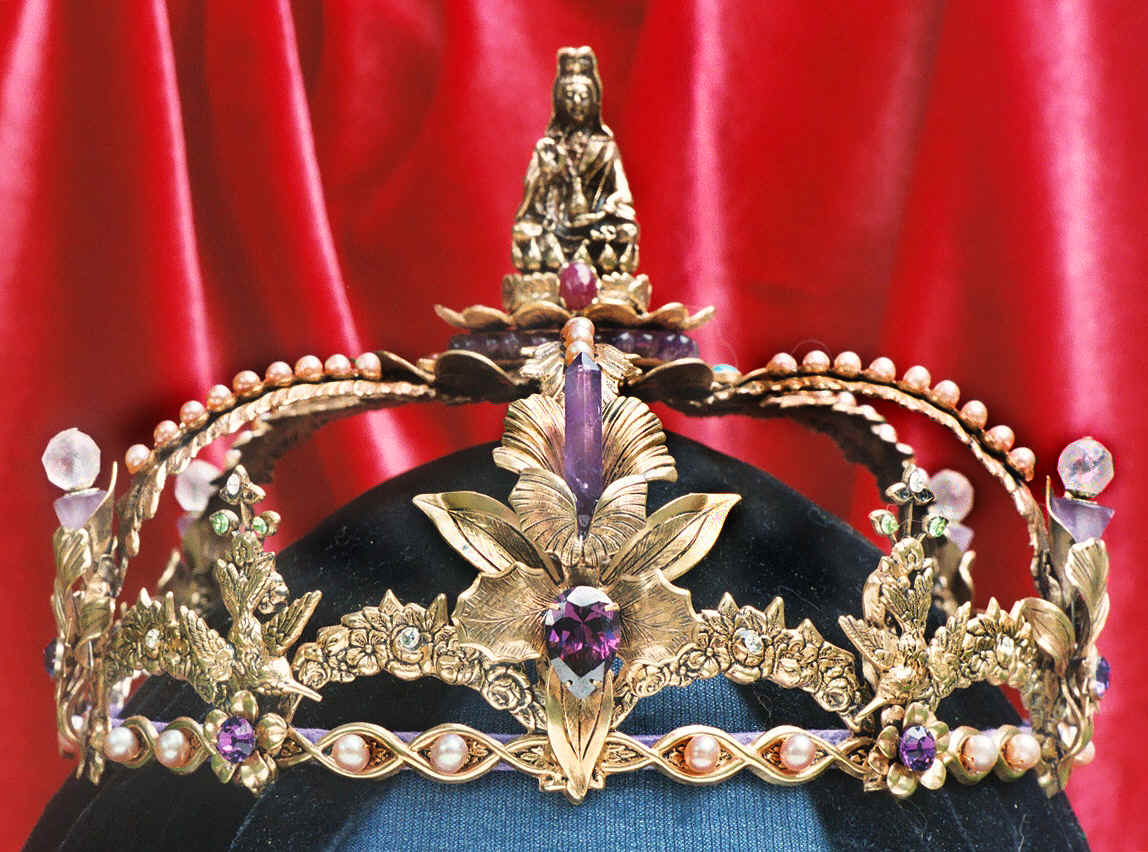
 When offering flowers, this signifies the practice of generosity and it opens up the heart!
When offering flowers, this signifies the practice of generosity and it opens up the heart!Remember this when you offer flowers.....it will make your heart sing!...and Buddha's too!
: )
May your visit to this site bless you with the compassionate, unconditional love of the beautiful Goddess and Bodhisattva Quan Yin.



| Mercy is always borne by the East Wind... | ||||||||||||||||||||||||
| A Poem to Kuan Yin (Excerpts from The Divine Feminine) Listen to the deeds of Kuan Yin Eternally Divine and wonderful With great vows, deep as the ocean, She saves all the suffering when their cries reach her. Serving the innumerable, She never fails to answer their prayers Even through inconceivable periods of time. Responding compassionately on every side. Giving great, clear and pure vows .... To hear her name, to see her body, to hold her in the heart, is not vaoin, For she can extinguish the suffering of existence | ||||||||||||||||||||||||

1 12oz. package soft silken tofu
1 T white miso
2 T pickled ginger + 1 T juice of the ginger
1 scallion chopped, white and green parts
1 tsp. organic soy sauce
2 T apple cider vinegar
½ tsp freshly ground white pepper
2 T water
http://www.kitchencaravan.com




Wang was a scholar who accidentally discovered the tea plant beneath the Guanyin rock in Xiping. He brought the plant back home for cultivation. When he visited Emperor Qianlong in the 6th year of his reign, he offered the tea as a gift from his native village. Emperor Qianlong was so impressed that he inquired about its origin. Since the tea was discovered beneath the Guanyin Rock, he decided to called it the Guanyin tea.

If one, longing for sensual pleasure,
achieves it, yes,
he's enraptured at heart.
The mortal gets what he wants.
But if for that person
— longing, desiring —
the pleasures diminish,
he's shattered,
as if shot with an arrow.
~Buddha

 Today is a great today to remember that we are universal beings and that we all are connected through the most powerful force in the universe......LOVE! Close your eyes and connect to your Beautiful Buddha Nature and know that you are loved beyond measure!
Today is a great today to remember that we are universal beings and that we all are connected through the most powerful force in the universe......LOVE! Close your eyes and connect to your Beautiful Buddha Nature and know that you are loved beyond measure! 
Medicine Buddha is an enlightened being who has unbiased compassion for all living beings. He protects one from sickness, dangers and obstacles, and helps to eradicate the cause of sickness and danger. He is a Buddha Doctor that people can rely upon. They say that just by hearing his name, you can be cured.
This teaching explains how to make the connection to this Buddha and the benefits, and how to practice the Medicine Buddha instructions.
Bhaiṣajyaguru (藥師佛 Ch. Yàoshīfó, 薬師 Jp. Yakushi), more formally Bhaiṣajyaguruvaidūryaprabha (Jp. 薬師瑠璃光如来 Yakushirurikō nyorai) and also known as the Master of Healing or Medicine Buddha, is the Buddha of healing. His full name means "Medicine Master Lapis Lazuli Light". In Mahayana Buddhism, Bhaiṣajyaguru represents the healing aspect of the historical Buddha Sakyamuni. The use of the analogy of a Buddha being depicted as a doctor who cures the illness of suffering using the medicine of his teachings appears widely in Buddhist scriptures.









Previously used in Tibet for meditation and ceremonial purposes, Tibetan Singing Bowls are struck with a padded mallet or rubbed around the rim with a playing mallet to produce a fascinating blend of harmonic resonances and rich overtones.

Due to her symbolising compassion, in East Asia Quan Yin is associated with vegetarianism. Chinese vegetarian restaurants are generally decorated with her image, and she appears in most Buddhist vegetarian pamphlets and magazines.

Queen Māyā of Sakya was the birth mother of the historical Gautama Buddha, Siddhārtha of the Gautama gotra, and sister of Mahāpajāpatī Gotamī the first woman ordained by the Buddha. "Māyā" means "illusion" or "enchantment" in Sanskrit and Pāli. Māyā is also called Mahāmāyā ("great Māyā") or Māyādevī ("Queen, literally 'goddess,' Māyā"). In Tibetan she is called Gyutrulma. Queen Mayadevi was born in Devadaha kingdom of ancient Nepal.










